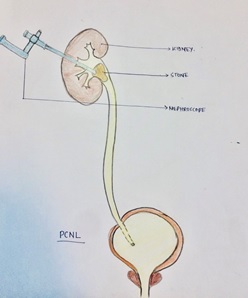Kidney / Stone Diseases
Percutaneous Nephrolithotomy (PCNL)
Our procedures and expertise
Percutaneous Nephrolithotomy (PCNL)

Procedure: Keyhole surgery performed through a 1cm incision in the skin overlying the kidney
Stenting Procedure: There will be a plastic (silicone made) stent of about 25cm to be placed during this surgery. This stent is temporary & need to be removed after 1 month in a day care admission.
Risks of this Procedure: While majority of patients have an uneventful surgery and recovery; few cases may be associated with complications. These are seen infrequently and not all the ones listed below are applicable to one individual. However it is important that you are aware of some of the common complications/risks that may arise out of this procedure which are as below:
- Inability to access/progress leading to abondenment of procedure
- You may need ancillary/other procedures to remove the stone
- Bleeding-Rarely severe bleeding due to arteriovenous fistula/ pseudoaneurysm requiring ancillary procedures like angioembolisation
- Urinary tract infection
- Fever and Sepsis requiring higher antibiotics and ICU stay
- Rarely kidney may get serious bleeding complications that may need removal of the kidney (in <1% of cases)
- Fluid accumulation in the area around the incision. This complication usually results from irrigation of the affected area of the kidney during the procedure
- Residual fragments/stones requiring ancillary procedures/ re-treatment Injury to surrounding organs
- In rare cases, PCNL has resulted in damage to the, pleura (leading to accumulation of air/water/blood around the lungs), intestines, liver, gallbladder, spleen, etc. requiring corrective surgeries
- Risk of DJ Stenting procedure: This stent may cause burning sensation while urinating & associated with mild flank pain. There may be little blood coming in urine which automatically subsides after taking water. This stent has chances of getting infection if left for prolonged period (more than 1-2 months) hence you need to get it removed as advised by surgeon.
